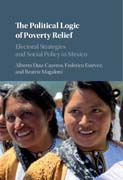
The Political Logic of Poverty Relief: Electoral Strategies and Social Policy in Mexico
Diaz-Cayeros, Alberto
Estévez, Federico
Magaloni, Beatriz
Poverty relief programs are shaped by politics. The particular design which social programs take is to a large extent determined by the existing institutional constrains and politicians' imperative to win elections. The Political Logic of Poverty Relief places elections and institutional design at the core of poverty alleviation. The authors develop a theory with applications to Mexico about how elections shape social programs aimed at aiding the poor. Would political parties possess incentives to target the poor with transfers aimed at poverty alleviation or would they instead give these to their supporters? Would politicians rely on the distribution of particularistic benefits rather than public goods? The authors assess the welfare effects of social programs in Mexico and whether voters reward politicians for targeted poverty alleviation programs. The book provides a new interpretation of the role of cash transfers and poverty relief assistance in the development of welfare state institutions. INDICE: Introduction; Part I: 1. Poverty relief in Latin America; 2. Poverty relief in Mexico - a geographic approach; 3. Political machines and vote buying; 4. Clientelism and the political manipulation of Pronasol; Part II: The consequences of clientelism and entitlements; 5. Improving communities - transfers and basic public services; 6. Saving lives - social programs and infant mortality rates; 7. Electoral pay-offs of antipoverty programs; Conclusion - the future of social protection.
- ISBN: 978-1-107-14028-8
- Editorial: Cambridge University Press
- Encuadernacion: Cartoné
- Páginas: 258
- Fecha Publicación: 26/02/2016
- Nº Volúmenes: 1
- Idioma: Inglés
